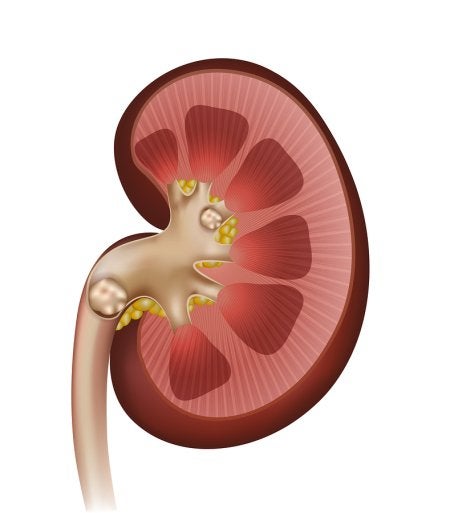-
Symptoms, Causes, and Treatment of Kidney Stones
If you’ve ever had kidney stones , then you know how painful they can be. These hard mineral clumps can cause extreme discomfort as they pass through your urinary system, and can cause urine to back up if they get stuck in a ureter or in your bladder. The good news is that your urologist can help you manage the pain associated with kidney stones and even help you prevent them in future. Continue reading to learn about recognizing the signs of kidney stones as well as understanding the causes and treatment options for them.

Symptoms
If the kidney stones are very small, they may not cause any symptoms at all. Urologists refer to these as silent stones. Larger stones, however, cause a range of symptoms. Pain is the most common. It usually comes on suddenly and may appear as cramping in the side, abdomen, groin, or lower back. It comes in waves but does not improve with rest and is usually quite severe. Nausea, vomiting, fever, and difficulty urinating may accompany the pain.
Causes
Kidney stones form when an excess of the minerals that form stones appears in the urine or when urine volume declines. A number of different factors can cause this to occur, including dehydration from inadequate fluid intake and urinary tract infections (UTI). Many medical conditions can increase the risk of kidney stones, including gout and diabetes. Some medications, such as diuretics, and dietary factors, such as a high-protein diet, can also contribute to kidney stone formation.
Treatment
Depending on the size of your kidney stone, it may pass on its own, and you may only need pain medications to ease your symptoms. If your stone is too large to pass without treatment, your urologist may prescribe medications or use a procedure called lithotripsy, during which shock waves are used to break up the stone. Surgery to remove the stone is also possible.
At Urology Associates P.C. , our doctors can help you get relief from the intense pain of kidney stones in Nashville, and help you develop strategies for preventing future bouts. If you’re experiencing the symptoms of a kidney stone, call us at (888) 329-7700.
-
Questions to Ask Your Urologist About Kidney Stones
Kidney stones are among the most common reasons for a visit to the urologist . These small deposits form inside the kidneys and may not cause symptoms for a while. However, when they begin to move around inside the kidneys or into the ureter, patients typically suffer from very intense pain and other troublesome symptoms. If you’ve been diagnosed with kidney stones, be a proactive patient by learning as much as you can about your condition. Your best source of information is your urologist.
 Will Medications Help?
Will Medications Help? If the stone is small enough to pass on its own, your urologist can prescribe pain relievers to improve your comfort level while you wait. If you only have mild pain, you might take ibuprofen or naproxen. Sometimes, an alpha blocker may be prescribed to relax the muscles in the ureter. This may reduce pain as the kidney stone passes.
Do I Need to Change My Diet?
While you’re waiting for the kidney stone to pass, it’s important to drink plenty of water. As a general rule of thumb, drink enough water so that your urine is clear. Even after you pass the kidney stone, it’s a good idea to continue drinking plenty of water to reduce your risk of future kidney stones. Additionally, some people may benefit from dietary changes . Ask your doctor if you should reduce your intake of salt, sugar, and animal protein, or increase your intake of fruits and vegetables.
Should I Have Surgery to Remove the Stone?
Many people can pass kidney stones without the need for surgery. However, some kidney stones are too large to pass. These will need to be removed surgically. Additionally, surgical intervention may be required if the kidney stones cause complications such as kidney damage, bleeding, or persistent urinary tract infections.
At Urology Associates, P.C. , we pride ourselves on our abiding commitment to superior patient education. If you’re suffering from kidney stones in Nashville, you can find the solutions you’re looking for at our facility. Should you require urology surgery for kidney stones, you can take advantage of the sophisticated medical technology in our Urology Surgery Center.
-
How Are Kidney Stones Treated?
Kidney stones are a common and very painful health problem. Previously, treatment for kidney stones consisted of open surgery, which required a long recovery time. However, as you’ll learn by watching this video, there have been several advances in the urology field over the past few decades.
This video features Dr. Charles Eckstein of Urology Associates, P.C. This urologist explains three treatment options available to patients, including a percutaneous nephrostomy, which involves making a small incision in the back and guiding a needle into the kidney. Then, a scope is passed into the kidney to remove the stone. The other treatment options are shock wave lithotripsy and ureteroscopy.
Urology Associates, P.C. provides the latest options for kidney stones treatment in Nashville as part of our comprehensive range of urology services. We encourage patients who are anticipating urology surgery to download our informational brochure on surgical procedures.
Recent Posts
categories
- Uncategorized
- Bladder Cancer
- Women's Sexual Health
- MonaLisa Touch
- Urology
- Urologist
- Erectile Dysfunction
- Kidney Cancer
- Incontinence
- Prostate
- MonaLisa Touch Laser Treatment
- Kidney Stones
- Urinary Tract Infections
- Event
- Sexual Dysfunction
- Testicular Cancer
- Prostate Cancer
- Urology Surgery Center
- urinary incontinence
- vaginismus
- noncoital pain disorder
- Hypoactive Sexual Desire Disorder
- Infographic
- provenge
- Xofigo
- robotic surgery
- hormone replacement
- diabetes
- renal cell carcinoma
- pelvic pain
- hematuria
- sexual health
- chronic testicular pain
- premature ejaculation
- Men's Health Clinic
- Dr. Melvin Seard
- Interstitial Cystitis
- vasectomy
- overactive bladder
- vaginal atrophy
- nocturia
- bladder infections
- urethral strictures
- Acute Epididymitis
- low sex drive
- circumcision
- pelvic floor dysfunction
- Peyronie's Disease
- prostatitis
- female sexual dysfunction
- varicocele
- difficult urination
- low libido
- PSA levels
- male fertility
- penile prosthesis
- prostatic intraepithelial neoplasia
- male infertility
- estrogen levels
- nurse navigator
- stress urinary incontinence
- vaginal yeast infection
- elevated psa
- painful sex
- adult circumcision
- epididymitis
- OAB
- kidney infection
- penile cancer
- pelvic organ prolapse
- Vasectomy Reversal
- bone health
- cystectomies
- clinical trials
- bloody urine
- Advanced Therapeutic Center
- WISH MedSpa
- neurogenic bladder
- WISH Team
- prostate biopsies
- BPH
- fecal incontinence
- lithotripsy
- osteoporosis
- kidney cysts
